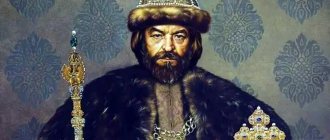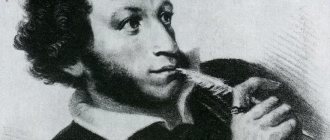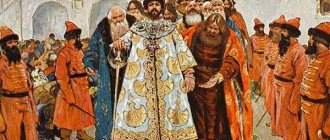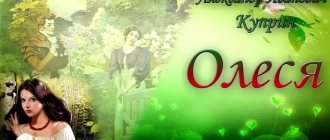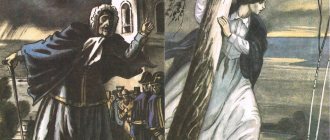School essays
How to write an essay? Guidelines for writing an essay
Typical mistakes in essays
Preparation for literature lessons (All essays are given as an example)
Oral folk art and ancient Russian literature
“The Tale of Igor’s Campaign” is the greatest monument of ancient Russian literature Mythological ideas of the Slavs Folk signs About proverbs and sayings Riddles Tongue twisters
A. N. Radishchev, M. V. Lomonosov
To the 250th anniversary of the birth of A. N. Radishchev Artistic originality of “Travel from St. Petersburg to Moscow” Mikhail Vasilyevich Lomonosov - reformer of the Russian language and versification
I. A. Krylov, D. I. Fonvizin, N. M. Karamzin
The skill of Krylov the fabulist Denis Ivanovich Fonvizin. The satirical orientation of the comedy “The Minor” An article about the work of I. A. Krylov N. M. Karamzin and Russian sentimentalism When Ivan Andreevich Krylov was little
A. S. Griboyedov
How to write an essay on A. S. Griboyedov’s comedy “Woe from Wit”? “The present century and the past century” (the main conflict in the comedy “Woe from Wit”)
V. A. Zhukovsky, G. R. Derzhavin, K. N. Batyushkov
Gabriel Romanovich Derzhavin - “the father of Russian poets” Poetry of V. A. Zhukovsky M. I. Tsvetaev. Two “Forest Kings” Great poet and humanist (About V. A. Zhukovsky) “Wonder Worker” of poetry Batyushkov
Pushkin A. S.
The theme of love in the lyrics of A. Pushkin The theme of love in the lyrics of A. Pushkin (2) The theme of friendship in the works of A. S. Pushkin The theme of friendship in the lyrics of Pushkin (2) Russian nature in the lyrics of A. S. Pushkin Freedom-loving lyrics of A. S. Pushkin A. S. Pushkin about the role and purpose of the poet and poetry About the high purpose of the poet and poetry in the lyrics of A. Pushkin The capital and local nobility in the novel by A. S. Pushkin “Eugene Onegin” What is the complexity and inconsistency of Onegin’s character? Option 1 What is the complexity and inconsistency of Onegin’s character? Option 2 A. S. Pushkin’s novel “Eugene Onegin” - “encyclopedia of Russian life” “Eugene Onegin” - “encyclopedia of Russian life” (2) Onegin and Lensky Onegin and Tatyana Onegin and Chatsky are different people of the same era. Option 1 Onegin and Chatsky are different people of the same era. Option 2 “...I love my dear Tatiana so much” “Tatyana is Russian in soul...” The artistic originality of Pushkin’s novel in verse “Tatyana’s sweet ideal” “The Superfluous Man” Onegin Preparatory questions for an essay based on the novel in verse by A. S. Pushkin “Eugene Onegin” Take care of your honor from a young age (Based on A. S. Pushkin’s story “The Captain’s Daughter”) People and power (Based on A. S. Pushkin’s tragedy “Boris Godunov”) Cases from the life of lyceum students Article about A. S. Pushkin’s poem “The Bronze Horseman” Where he lives Chernomor? “Volatile features...” Portraits of A. S. Pushkin My first friend...
M. Yu. Lermontov
Image of Lermontov. Article by M. Yu. Lermontov on the role and purpose of the poet and poetry The theme of loneliness in the lyrics of M. Yu. Lermontov M. Yu. Lermontov about his generation The life and feat of Mtsyri “Mtsyri” by M. Yu. Lermontov as a romantic poem The rebellious spirit of M. Yu. Lermontov’s lyrics. Y. Lermontov “I love the Fatherland, but with a strange love” What is the tragedy of Pechorin? “A Hero of Our Time” by M. Yu. Lermontov - a socio-psychological novel Materials for an essay based on the novel by M. Yu. Lermontov “A Hero of Our Time” When Mikhail Yuryevich Lermontov was little
N.V. Gogol
The world of bureaucracy in N.V. Gogol’s comedy “The Inspector General” What does N.V. Gogol condemn in the comedy “The Inspector General”? Funny and sad in N.V. Gogol's comedy "The Inspector General" Materials for an essay in N.V. Gogol's comedy "The Inspector General" Landlord Rus' in N.V. Gogol's poem "Dead Souls" Chichikov - the knight of profit Officials in the poem by N.V. Gogol’s “Dead Souls” The people in N.V. Gogol’s poem “Dead Souls” N.V. Gogol’s poem “Dead Souls” is a brilliant satire on feudal Rus' Materials for an essay based on N.V. Gogol’s poem “Dead Souls”
F. I. Tyutchev, A. A. Fet
Lyrics by F. I. Tyutchev and A. A. Fet Eternal themes in the lyrics of Tyutchev and Fet Materials for preparing for an essay on the works of Tyutchev and Fet Russian poet-philosopher “The winged sound of words”
A. N. Ostrovsky
“Cruel morals” of the city of Kalinov A living soul in the “dark kingdom” Problems of Ostrovsky’s play “The Thunderstorm” The tragedy of a suffering soul in the world of businessmen (based on the drama by A. N. Ostrovsky “Dowry”) The fate of a homeless woman (based on the play “Dowry” by A. N. Ostrovsky) )
I. A. Goncharov
Oblomov and Oblomovism A novel about the everyday life of ordinary people (based on the novel “An Ordinary Story”) What is “Oblomovism”?
I. S. Turgenev
Materials for preparing for an essay based on the novel by I. S. Turgenev “Fathers and Sons” A democrat commoner in the “noble nest” The author and his hero in the novel “Fathers and Sons” by I. S. Turgenev Problems of the novel “Fathers and Sons” Tragic figure Evgenia Bazarov in Turgenev’s novel “Fathers and Sons” A man from the nobility at the turn of eras (based on the novels “Rudin” and “The Noble Nest”) On the 180th anniversary of the birth of Ivan Sergeevich Turgenev. A story about the writer's childhood
N.G. Chernyshevsky
“New People” by Chernyshevsky (based on the novel “What is to be done?”) A special person Rakhmetov (based on the novel by N.G. Chernyshevsky “What is to be done?”)
N. A. Nekrasov
The city in the image of N. A. Nekrasov The homeland and people in the lyrics of N. A. Nekrasov The image of a Russian woman in the poetry of N. A. Nekrasov N. A. Nekrasov about the role and purpose of the poet Pictures of native nature in the lyrics of N. A. Nekrasov Citizenship of poetry Nekrasova In search of national happiness (based on Nekrasov’s poem “Who Lives Well in Rus'”) The image of a Russian woman in Nekrasov’s poetry
F. M. Dostoevsky
Raskolnikov’s theory and its downfall The world of the humiliated and insulted in F. M. Dostoevsky’s novel “Crime and Punishment” Materials for an essay based on F. M. Dostoevsky’s novel “Crime and Punishment” The meaning of the title of the novel “Crime and Punishment” Crime and Punishment by Rodion Raskolnikov St. Petersburg Dostoevsky Biblical motifs in the works of F. M. Dostoevsky
L. N. Tolstoy
Female images of L. N. Tolstoy's novel "War and Peace" The role of portrait characteristics of the heroes in L. N. Tolstoy's novel "War and Peace" "People's Thought" in L. N. Tolstoy's novel "War and Peace" Two commanders The path of Andrei's quest Bolkonsky Spiritual evolution of Pierre Bezukhov Unusual portrait of Pierre Bezukhov Portrait of Petya Rostov Military feat of the Russian people in the Patriotic War of 1912 (based on the novel by L.N. Tolstoy “War and Peace”) People’s commander Kutuzov (based on the novel by L.N. Tolstoy “War and Peace” "") The Bolkonsky family and the Rostov family Andrei Bolkonsky and his road of honor Search for the meaning of life by Pierre Bezukhov
N. S. Leskov
“Positive type” of a Russian person in Leskov’s work The verdict of posterity. Article about N. Leskov’s story “The Stupid Artist” Leskov’s Wanderer (based on the story “The Enchanted Wanderer”)
M. E. Saltykov-Shchedrin
Battle satire The fairy tale genre in the works of Saltykov-Shchedrin The satirical talent of the writer Shchedrin
A. P. Chekhov
Past, present and future in A. P. Chekhov’s play “The Cherry Orchard” Sample text of an essay based on A. P. Chekhov’s story “Ionych” “The Cherry Orchard” - a comedy, drama or tragedy? Features of A.P.'s stories Chekhov Innovations of Chekhov the playwright Chekhov's “The Cherry Orchard”
I. A. Bunin
Materials for an essay on the works of I. A. Bunin Ivan Alekseevich Bunin. Essay on life and work Realistic features of Bunin's prose The motive of love and death in Bunin's stories Bunin and the Russian revolution The creative path of I. A. Bunin
A. I. Kuprin
“Love is always a tragedy...” (based on the works of A. I. Kuprin) What is the meaning of the title of A. I. Kuprin’s story “The Duel”? The author and his hero in A. I. Kuprin’s story “The Duel” The singer of sublime love (based on Kuprin’s stories “The Garnet Bracelet”, “Olesya”, “Shulamith”) The duel of violence and humanism (Based on the story “The Duel” by Kuprin)
A. M. Gorky
The problem of humanism in A. M. Gorky’s play “At the Depths” Gorky’s early romanticism Gorky’s realistic depiction of the bottom of society (based on the play “At the Depths”) The image of the merchants in M. Gorky’s story “Foma Gordeev”
V. Bryusov, N. Gumilev, A. Akhmatova, K. Balmont, I. Annensky, A. Bely, M. Voloshin
“Silver Age” of Russian literature My discovery of the “Silver Age” of Russian poetry Fate and poems of Nikolai Gumilyov Mythology of Nikolai Gumilyov The conscience of the people is the poet... Essay on M. Voloshin Don Juan, Napoleon, Cleopatra, Dante and other “darlings of the centuries” in the works of A. Bryusov Acmeism Features of the poetic world of Anna Akhmatova Theme of the Motherland in the poetry of Anna Akhmatova The founder of symbolism in Russian poetry. Essay about Balmont
A. A. Blok
Materials for an essay based on A. Blok’s poem “The Twelve” Russia in the lyrics of A. A. Blok Artistic features of Blok’s lyrics Theme of the Motherland in Blok’s poetry Poems by Alexander Blok
V. V. Mayakovsky
The theme of the poet and poetry in the work of V. Mayakovsky V. Mayakovsky and the revolution Satire of V. Mayakovsky Innovation of Mayakovsky's poetry Excerpt from B. Pasternak's article about V. Mayakovsky and S. Yesenin The theme of the poet and poetry in the work of Mayakovsky My impressions of V. Mayakovsky's poem “Cloud in Pants” Satirical line of V. Mayakovsky’s poem “Good”
S. A. Yesenin
The theme of the homeland in the lyrics of S. Yesenin The theme of the homeland in the work of Sergei Yesenin Images-symbols in the poetry of Sergei Yesenin Yesenin’s lyrical hero Man and nature in Yesenin About Sergei Yesenin’s poem “Anna Snegina”
A. Fadeev, B. Pasternak, M. Bulgakov
Personality and revolution (based on the works of A. Fadeev, M. Bulgakov and B. Pasternak) Handwriting similar to cranes. An article about the work of B. Pasternak Boris Leonidovich Pasternak. Brief sketch of creativity Materials for an essay on the work of Boris Pasternak Sharikov and Sharikovism
M. I. Tsvetaeva
Poems cannot be homeless... Article about the work of M. Tsvetaeva
M. Sholokhov, B. Mozhaev, F. Abramov
The fate of the Don Cossacks (based on the novel “Quiet Don” by M. A. Sholokhov) Materials for an essay based on the novel “Quiet Don” Materials for an essay based on the novel “Virgin Soil Upturned” Encyclopedia of Cossack life (based on M. Sholokhov’s novels “Quiet Don” and “Virgin Soil Upturned”) virgin lands") The fate of the Russian peasantry during the period of collectivization (based on the works of M. Sholokhov, B. Mozhaev, F. Abramov)
A. Solzhenitsyn, V. Shalamov, V. Grossman, Yu. Dombrovsky, V. Bykov. The Great Patriotic War in modern literature and poetry
Tragedy and hopes of the generation of the 30s Theme of the Great Patriotic War in modern literature The Great Patriotic War in modern literature The moral choice of heroes in V. Bykov’s story “Sotnikov” Active resistance to evil (based on the works of Vasil Bykov) Poems about war. A. T. Tvardovsky. Essay Poems about war. O. Berggolts. Essay Tvardovsky's military lyrics Russian soldier in Tvardovsky's poem "Vasily Terkin" The image of war in the works of Konstantin Simonov Man in a totalitarian state (based on the story "One Day in the Life of Ivan Denisovich" by A. I. Solzhenitsyn)
Other writers of the Soviet period
About the work of Ch. Aitmatov Peter I and his era in A. N. Tolstoy’s novel “Peter I” “Bison” - Granin’s story about the great scientist How books are written. Article about M. M. Prishvin Our mutual friend. Sergei Vladimirovich Mikhalkov Poetry bequeathed to descendants (Nikolai Alekseevich Zabolotsky)
Foreign literature
The tragedy of Gobseck The heroic Homeric epic Our contemporary William Shakespeare The creator of French comedy (Jean-Baptiste Molière) The great German poet and thinker (Johann Wolfgang Goethe) The romanticism of the great French writer (Victor Hugo) The brilliant author of “The Human Comedy” (Honoré de Balzac) The Circumlocution of William Sidney Porter (O. Henry) The tragedy of the individualist. (Jack London) Man in the 20th century through the eyes of Hemingway The transition of a teenager to the world of adults (Based on the novel by J. Selinger “The Catcher in the Rye”) “Only the heart is vigilant” (Antoine de Saint-Exupery) The riddle of the poem by R.-L. Stevenson “Stormy Night”... Hymn to mysterious freedom (French poet Arthur Rimbaud) Kalevala - the great poem of the North
Russian proverbs, tongue twisters and riddles
Although the eye can see, the tooth is numb. Cycle of proverbs The wolf always has one song. A series of proverbs: The Cowardly Bunny and the Stump of the Wolf. Cycle of proverbs As you are, so are the sleighs. A series of proverbs The falcon does not fly higher than the sun. Cycle of proverbs One with a fry, and seven with a spoon. Cycle of proverbs Don't beat Thomas for Eremin's guilt. Cycle of proverbs It flies high, but lands somewhere. Cycle of proverbs A bad peace is better than a good quarrel. Cycle of proverbs The city takes courage. A series of proverbs: The fragile shoulders of an applicant. “Pearls” from essays written during the entrance exams at Moscow State University
The people and their role in the tragedy Boris Godunov Alexandra Pushkin
Alexander Sergeevich Pushkin often used in his work the most poignant and dramatic pages in Russian history. In the tragedy "Boris Godunov" he recreated "the past century in all its truth." The poet successfully achieved unprecedented climaxes in the art of drama... The characters in this tragedy are historically reliable, act and reason in accordance with their era and morals.
Boris Godunov is described by Pushkin comprehensively and exhaustively. This is an excellent father, striving to give happiness to his own children, a righteous and attentive ruler, thinking about the good of the people, but why does he fail everywhere? There is no luck and happiness for his children:
I may have angered the heavens
I could not arrange your happiness.
Guilty one, why are you suffering?
Belinsky noted that already in the first scene of the tragedy “the character of Shuisky is depicted both historically and poetically.” This is the head of the boyar group, a descendant of the appanage princes of the “Rurik blood”. He himself is not averse to taking the throne of the Moscow Tsars, which was vacated after the death of Tsar Fedor. But Shuisky understands very well that he cannot achieve his goal without the help of the people, and therefore invites Vorotynsky to “skillfully excite the people.” But when Boris is elected, Shuisky turns into a “crafty courtier.” He expresses his devotion to Boris, but fully shares the rebellious aspirations of Afanasy Pushkin. Shuisky is a typical courtier, “evasive, but brave and crafty.”
Other boyars were also depicted in the tragedy: the timid and simple-minded Vorotynsky; the true exponent of boyar views Afanasy Pushkin; who went over to the side of the Pretender Gavrila Pushkin, the poet’s ancestor, Golitsyn, Masalsky and others. Pushkin needed these images in the tragedy to show the relationship between the tsar and the boyars, the ruling class and the people.
Transferring the action of the tragedy to Poland, Pushkin also depicts the feudal Polish aristocracy: Mniszek, Vishnevetsky and others. Much attention is paid to Marina Mnishek. “Marble nymph”, cold beauty, Marina is ambitious, arrogant, cunning. It is not a feeling of love, but a thirst to become the queen of Moscow that guides her when she agrees to become the wife of the Pretender.
There is an accusation in the very air that Godunov is the murderer of Tsarevich Dmitry. The boyars do not dare express this to the tsar, they have something to lose, they want to save their privileges, localism, and proximity to the throne by any means necessary.
The people are constantly dissatisfied with their humiliated position, their subordination to everything and everyone. Sometimes it results in riots that end in nothing. The rulers know how to stop the people in time, to cajole them not so much with effective measures as with momentary handouts and promises. Shuisky very well explains to Boris the essence of the people.
Pushkin shows that the real reason for the death of Boris lies in the forces that rebelled against him. Here the first and main place belongs to the people. The people are the main characters of Pushkin's tragedy. The people are given a central place in the composition of the tragedy: the people appear at the very beginning of the tragedy, and they also complete it, after the death of Boris and before the entry of the Pretender into Moscow; the latter, after the scene in the forest, no longer appears in the tragedy. It is not individual heroes (Boris and the Pretender), but the people who complete the tragedy.
The people are the creator of history, the true foundation of the state. Without the support of the people, both kings and boyars are powerless. The people supported the election of Boris to the throne, and when they turned away from him, Boris died. The people ensured victory for the Pretender. The power of the people is limitless.
The people have an ineradicable desire for freedom, for the fight against tyranny. The people are a rebellious element, always inclined to rebel against their oppressors. Afanasy Pushkin confidently declares to Shuisky: “If the Pretender tries to promise them the old St. George’s Day, then the fun will follow.” Clever Basmanov says to Boris: “People are always secretly inclined to confusion.”
The strength of the people lies in their inherent high moral purity and aversion to crime. He cannot forgive Boris for killing the baby. The people cannot forgive the Pretender for the death of Godunov’s widow and son. Thus, the people act as a formidable judge of the lawlessness and crimes of the royal power.
Pushkin, based on the history of the 17th century, gives an answer to the most important questions of his time. The Decembrist uprising was approaching; their weakness was that they acted in isolation from the broad masses.
Surpassing the historians and writers of his time with the brilliant instinct of a great poet, approaching our understanding of the role of the people in history, Pushkin shows both the enormous strength of the people and their historically determined weakness at that time - at the beginning of the 17th century. The people can overthrow tyrants, but they are unable to ensure their own welfare and freedom and take advantage of their victory in the interests of the people. The reason for this is darkness, the political ignorance of the masses. Taking advantage of this darkness of the people, it is the tsars and boyars who create politics, not the people; They appropriate the fruits of the people's victory for themselves. Pushkin clearly shows this both in the first scenes of the tragedy (“Red Square”, “Maiden’s Field”) and in the final scene.
The people in the drama are depicted in motion, in the formation of moral self-awareness. The scene of the first appearance of the people on Red Square invites us to think about the particular shock of the masses of the people who found themselves without a crown bearer:
Oh my God, who will rule us?
Oh woe to us!
In the subsequent act - on the Maiden Field - the people pray to Boris to ascend the throne. However, this happens on the instructions of the boyars: “The boyars know that.” As we see from the remarks exchanged by those stationed in this place, a significant proportion of the people are absolutely indifferent to the choice of the sovereign. For her, this is simply an entertaining show.
At the conclusion of the drama, the people are already different: they independently take an active part in what is happening, without concealing their own hatred of the royal house.
